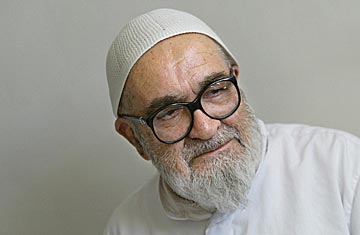
Grand Ayatollah Hossein Ali Montazeri in May 2005.
Grand Ayatullah Hossein Ali Montazeri was known as Iran's defiant cleric, first in challenging the autocratic rule of the Shah, and then later in confronting the very revolution he had helped foment. Now, the big question in Tehran is whether his sudden death of natural causes will catalyze a broader showdown between the regime and the opposition Green Movement.
Montazeri, who died at 87 in the holy city of Qom, was one of only a handful of grand ayatullahs in Shi'ite Islam. Having once been designated to succeed the revolution's founder, Grand Ayatullah Ruhollah Khomeini, as Supreme Leader, his outspoken criticism of the regime gave cover and legitimacy to the opposition Green Movement — and infuriated a theocracy ruled by his clerics of lesser rank.
Following the disputed June 12 election, Montazeri publicly questioned the victory of President Mahmoud Ahmadinejad, and warned Iran's security forces that they would have to answer to God for their actions against protestors. In a soul-searching letter to Iran's clerics and seminaries, Montazeri recently stated: "The goal (of the revolution) was not simply to change the names and slogans but keep the same oppression and abuses practiced by the previous regime. Everyone knows I am a defender of theocratic government, although not in the current form. The difference lies in the fact that I intended for the people to choose the jurist and supervise his work... I now feel ashamed of the tyranny conducted under this banner. What we see now is the government of a military guardianship, not the guardian of Islamic scholars."
Montazeri's transformation is a microcosm of Iran's revolutionary experience, and the evolving split among the clerics. "Montazeri began as a radical and a principle architect of the system of government that placed so much power in the hands of the Supreme Leader," said Shaul Bakhash, author of The Reign of the Ayatollahs. In the 1980s, he was also patron of the World Islamic Movement, a group committed to exporting Iran's revolution. His son Mohammad trained with the PLO in Lebanon.
But on the revolution's 10th anniversary in 1989, Monatzeri dared to criticize the regime for failing to fulfill its early promise. He condemned mass executions of dissidents. And he called on the government to correct "past mistakes." After Khomeini's fatwa imposing a death sentence on Satanic Verses author Salman Rushdie, Montazeri warned, "People in the world are getting the idea that our business in Iran is just murdering people."
Adds Bakash, "Later in life he became a defender of individual rights which he [had] ignored in the early years of the revolution," championing everything from an open press to freer speech.
For his bluntness, Montazeri has lived under virtual house arrest since 1997, when his religious school was alsoclosed down. His office has occasionally been attacked; religious vigilantes once smeared "Heretic of the Age" across his wall, and guards were often posted outside to cut off contacts. But in 2000, he began using the Internet to reach beyond his jailers, corresponding with other clerics and supporters seeking his rulings.
Given his clerical superiority and his outspoken views, it's hardly surprising that Montazeri became the nemesis of Iran's current Supreme Leader, Ali Khamenei. "Khamenei doesn't really have a reply when Montazeri proclaims that the Islamic Republic of Iran is neither Islamic nor a Republic," said Karim Sadjadpour of the Carnegie Endowment for International Peace. His immense standing was reflected in the fact that news of his death sent thousands of Iranians streaming to Qom. Grand Ayatollahs walked to his home in a show of respect, while opposition websites reported new protests against the regime at several universities. Several showed video clips of supporters shouting "Montazeri, your path will continue" and "Our green Montazeri, congratulations on your freedom."
With his passing, the Green movement loses a spiritual mentor. "His death is certainly a blow to the opposition, but it shouldn't dramatically affect their fortunes," said Sadjadpour. "It could also prove a catalyst for more protests, especially given the fact that he died during Muharram [a Shi'ite holy month that celebrates martyrdom]." Montazeri is to be buried Monday, and mourned a week later in a ritual that coincides with Ashura — the holiest Shi'ite day of mourning marking the martyrdom of Hossein, grandson of the prophet Mohammed's grandson, in the fight against injustice. Montazeri's passing will also be commemorated on eleventh and fortieth days after his death, each day of mourning marking an emotional opportunity for his opposition supporters to rally.
"What made Montazeri unique was his integrity," said Sadjadpour. "Despite the power and wealth that many of Iran's political clerics have amassed, very few of them will die like Montazeri, revered by the public and with their integrity intact."
